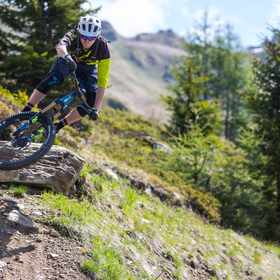Intend’s only non-inverted fork is beautifully boutique. The 7075 aluminium lowers are CNC-machined in parts then bolted and bonded together.
- Mountain bike suspension setup: video guides to help you get the most from your bike
- Best mountain bike suspension forks
A clever, reversible volume spacer offers two progression options, or it can be removed entirely, giving three progression options in one. I removed it to get more support in the middle of the travel without the final 20mm or so becoming inaccessible.
I needed the rebound fully open for it to remain fully active over rapid-fire hits, any slower and sensitivity would suffer. This setting was perfect for me, but lighter riders, especially in cold temperatures, may not be able to get it fast enough for some trails.
Intend recommends 1 to 1.1psi per kilo of bodyweight. At 85kg, I tried everything from 80 to 100psi, but settled on 90 – any less and it lacked support under braking. But even at this pressure, it’s not as settled into the very first part of the travel as most forks, making it less ground-hugging when off the brakes.
This relatively firm beginning to the travel also means it tops-out when pulling up to manual or hopping obstacles, even with the rebound slower than I’d like.
Because the valve fills both positive and negative chambers simultaneously, setting the pressure with the fork 10mm into its travel overfills the negative chamber, improving off-the-top sensitivity and eliminating the top-out issue. It reduces the available travel by 5 to 10mm but provides good initial suppleness. However, the air spring will re-set itself after a while.
Set up like this, traction and sensitivity were very good. Friction was kept impressively low and it takes very little force to budge it from its sagged position and reacts to small bumps very well. It feels supple and active particularly in the middle part of its travel.
However, on fast, square-edged hits and rough, high-load turns, there’s slightly more feedback and waywardness than with a RockShox Lyrik or Fox 36, for example.
Intend sent over a lighter high-speed compression damping circuit, which is easy enough to swap out, but this didn’t really help. It could be that the fork is binding or flexing on these jarring impacts, but it’s hard to be sure given I can only test the fork as a complete package.
Nevertheless, the sensitivity is impressive and these shortcomings are fairly subtle and only surface occasionally on certain types of terrain.
How we tested
We tested seven burly enduro forks, and to make it a fair test, all forks had 170mm travel, around 42mm offset and were fitted to a 29in wheel. The same bike was used (a Privateer 161), with an identical setup and tyre pressures throughout.
We worked hard to optimise the setup of each fork by experimenting back and forth with all the available adjustments. Then they were tested back-to-back on the same familiar trails and in the same conditions, using an uplift to minimise the time between runs so the previous fork’s performance was fresh in our minds. Only when testing like this do the differences between forks stand out.
The standard of forks on test was considerably higher than 2020, and some new or upgraded models have seen firm favourites tumbling down the rankings.
Also on test:
Product
| Brand | Intend |
| Price | €1428.00, £1236.00 |
| Weight | 2296g |
Features
| Spring type | air |
| Wheel size | 29in_700c |
| Offset | 44.0000 |
| Offset | MILLIMETER |
| Travel | 170.0000 |
| Travel | MILLIMETER |
| Features | Adjustments: low-speed compression, low-speed rebound, air spring pressure, 3-in-1 volume spacer Travel: 140-180mm (29” only), internally adjustable |


